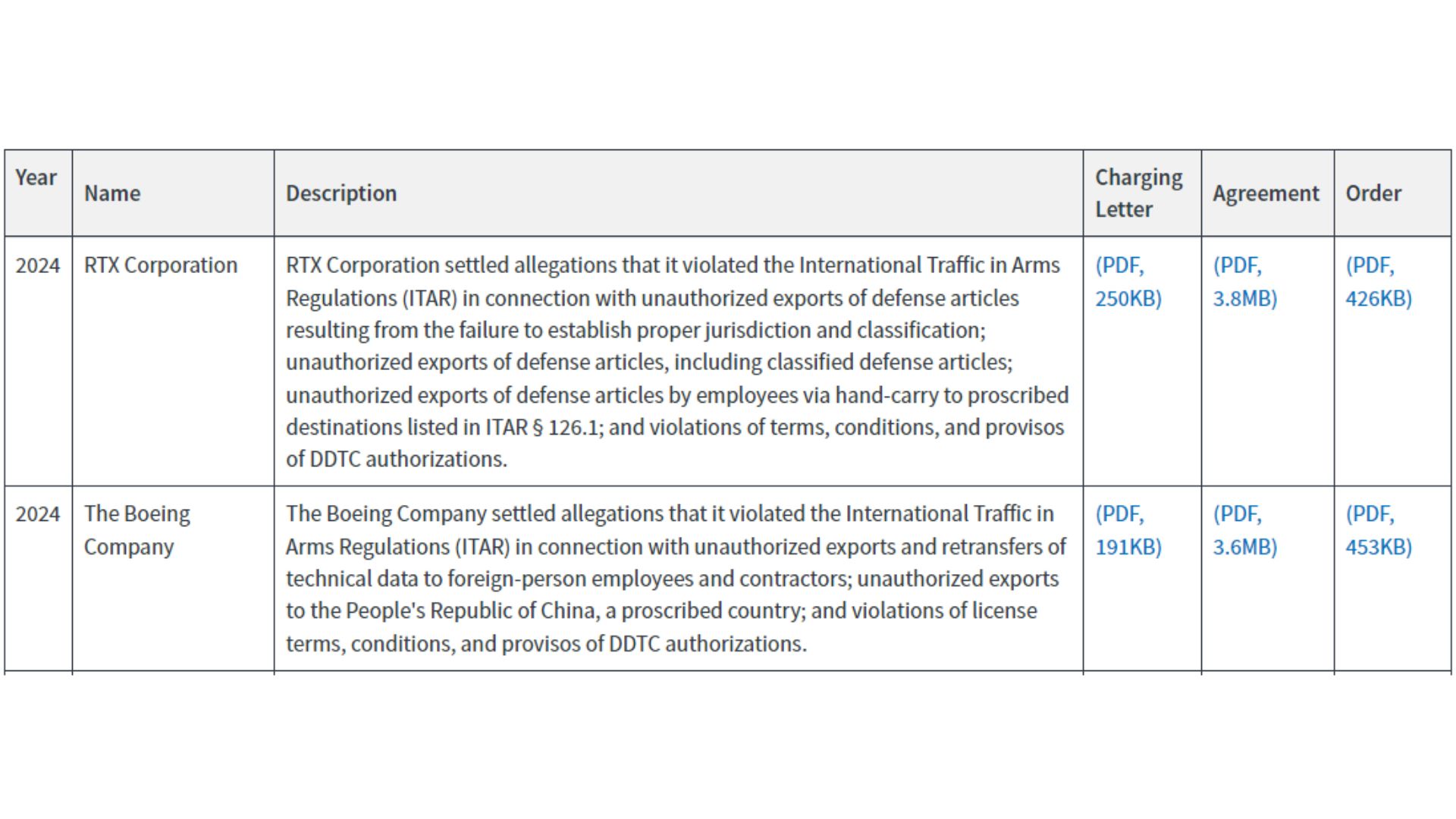Recently, Raytheon Corporation (RTX), one of America’s largest defense contractors, got hit with a whopping $200 million fine from the State Department.
Why? Because they apparently messed up—big time.
RTX was caught red-handed shipping sensitive military information to places like Russia, China, and Iran.
This wasn’t just a one-off mistake, either.
We’re talking about 750 violations of the International Traffic in Arms Regulations (ITAR) over a span of six years.
As military veterans, we know firsthand the value of the information they let slip, and trust me, this is a serious issue.
Here’s a more in-depth look at what we think about this report.
The Scale of the RTX Violations
First and foremost, let’s talk about just how deep this problem runs.
Between 2017 and 2023, RTX, which includes some heavy hitters like Raytheon and Collins Aerospace, managed to commit 750 violations, according to the State Department report last Friday, August 30.
RTX will pay a $200 million fine to settle allegations it violated export laws by exchanging data and products with prohibited countries including China. The fine stems from failure to abide by the International Traffic in Arms Regulations https://t.co/pIJPh9SgLi pic.twitter.com/uyVAML0vK4
— Reuters Legal (@ReutersLegal) August 30, 2024
That’s not just a few mistakes—that’s a pattern of negligence.
These violations involved everything from unauthorized exports of defense articles to improper handling of classified materials.
And the worst part? The information ended up in the hands of some of our biggest adversaries.
I mean, come on, we’re talking about military secrets related to nearly two dozen aircraft, including top-tier fighters like the F-22 and bombers like the B-2.
If you’re wondering how bad this is, imagine giving your playbook to the opposing team before the big game—that’s what happened here.
What Exactly Went Wrong?
Now, you might be wondering, “How does something like this even happen?” Well, it wasn’t just one thing—it was a whole series of screw-ups.
Take Collins Aerospace, for example. They sent sensitive technical data to Chinese suppliers, who then used that information to make parts for US military aircraft.
Talk about a bad move!
Then, there were RTX employees traveling to Russia and Iran with laptops full of classified info.
Despite having cybersecurity protocols in place, these warnings were ignored, and, surprise, surprise, sensitive data got compromised.
Most of these violations trace back to when Collins Aerospace was still Rockwell Collins before it got scooped up by United Technologies Corporation and then merged with Raytheon to form RTX.
This patchwork of mergers and acquisitions only muddled things further, making it hard to keep track of who was responsible for what.
The Fallout and What Comes Next
So, what’s the fallout from all this? Well, the US government slapped RTX with a $200 million fine.
Now, they’re letting RTX off the hook for half of that if they pump $100 million into fixing their compliance issues, according to a report by Flight Global.
They’re also requiring RTX to undergo external audits and agree to a three-year consent agreement.
Basically, the government is saying, “Clean up your act, or we’ll be back for more.”
But here’s the thing: RTX isn’t the only one in the hot seat.
Earlier this year, Boeing got hit with a $51 million fine for its own ITAR violations. This isn’t just a one-off issue—it’s a widespread problem across the defense industry.
And if you ask me, it’s high time these companies get their act together.

What Does This Mean for National Security?
Now, let’s talk about what this means for national security.
When classified data gets into the wrong hands, it’s not just a corporate issue—it’s a threat to our military and, ultimately, our country.
Information on our latest aircraft, our cutting-edge technology, and our military strategies are now potentially in the hands of countries that don’t exactly have our best interests at heart.
This compromises our tactical edge and puts our servicemen and women at risk. It’s like giving away the blueprints to the castle while leaving the gates wide open.
The US government has to step up its game, too.
More regulations and oversight are likely needed to prevent these kinds of breaches from happening again.
We need to send a clear message that messing around with sensitive information won’t be tolerated—period.
Final Thoughts: Stay Sharp and Stay Secure
So, where does this leave us?
The RTX case is a stark reminder that, even in the corporate world, national security should never take a back seat.
As veterans, we know the importance of safeguarding sensitive information and that this must go beyond just avoiding fines. It’s about protecting the men and women who serve and keeping our country safe.

Moving forward, defense contractors need to tighten up their compliance measures and make sure they’re doing everything they can to prevent this from happening again.
Because when it comes to national security, there’s no room for error. And if we don’t learn from these mistakes, we’re just setting ourselves up for bigger problems down the line.
In the end, protecting our nation’s secrets is a collective responsibility. From the top brass at the Pentagon to the guys on the ground, everyone has a role to play in keeping America safe.
And for companies like RTX, it’s time to step up and take that responsibility seriously.
—
Disclaimer: SOFREP utilizes AI for image generation and article research. Occasionally, it’s like handing a chimpanzee the keys to your liquor cabinet. It’s not always perfect and if a mistake is made, we own up to it full stop. In a world where information comes at us in tidal waves, it is an important tool that helps us sift through the brass for live rounds.










COMMENTS